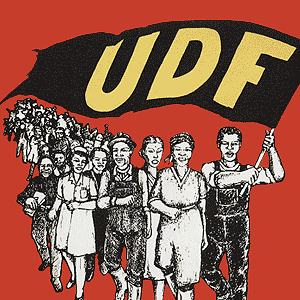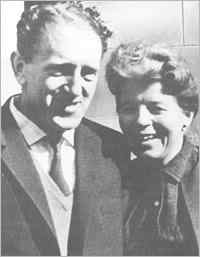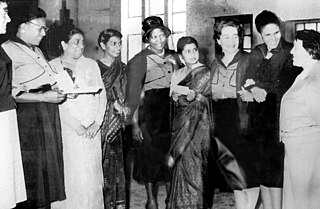
The African National Congress (ANC) is a social-democratic political party in South Africa. It has been in power since the election of lawyer, activist and former political prisoner Nelson Mandela at the first free and fair elections in 1994, and has been re-elected at every election since, though with a reduced majority every time since 2004. Cyril Ramaphosa, the incumbent President of South Africa, has served as President of the ANC since 18 December 2017.

The South African Communist Party (SACP) is a communist party in South Africa. It was founded in 1921 as the Communist Party of South Africa (CPSA), dissolved in 1948, was declared illegal in 1950 by the governing National Party, was refounded as the SACP in 1953, and participated in the struggle to end the apartheid system. It is a partner of the Tripartite Alliance with the African National Congress and the Congress of South African Trade Unions (COSATU) and through this it influences the South African government. The party's Central Committee is the party's highest decision-making structure.

Joe Slovo was a South African politician, and an opponent of the apartheid system. A Marxist-Leninist, he was a long-time leader and theorist in the South African Communist Party (SACP), a leading member of the African National Congress (ANC), and a commander of the ANC's military wing Umkhonto we Sizwe (MK).

The Freedom Charter was the statement of core principles of the South African Congress Alliance, which consisted of the African National Congress (ANC) and its allies: the South African Indian Congress, the South African Congress of Democrats and the Coloured People's Congress. It is characterised by its opening demand, "The People Shall Govern!"
The Treason Trial was a trial in Johannesburg in which 156 people, including Nelson Mandela, were arrested in a raid and accused of treason in South Africa in 1956.

The United Democratic Front (UDF) linked hundreds of popular organisations together in the struggle against apartheid. The non-racial coalition of about 400 civic, church, students', workers' and other organisations was formed in 1983, initially to fight the new Tricameral Parliament. The UDF's goal was to establish a "non-racial, united South Africa in which segregation is abolished and in which society is freed from institutional and systematic racism." Its slogan was "UDF Unites, Apartheid Divides."
The Congress of the People was a gathering organised by the National Action Council, a multi-racial organisation which later became known as the Congress Alliance, and held in Kliptown on 26 June 1955 to lay out the vision of the South African people. The Freedom Charter was drawn up at the gathering, which was statement of core principles of the Alliance and a symbol of internal resistance against apartheid.

Denis Theodore Goldberg was a South African social campaigner, who was active in the struggle against apartheid. He was accused No. 3 in the Rivonia Trial, alongside the better-known Nelson Mandela and Walter Sisulu, where he was also the youngest of the defendants. He was imprisoned for 22 years, along with other key members of the anti-apartheid movement in South Africa. After his release in 1985 he continued to campaign against apartheid from his base in London with his family, until the apartheid system was fully abolished with the 1994 election. He returned to South Africa in 2002 and founded the non-profit Denis Goldberg Legacy Foundation Trust in 2015. He was diagnosed with lung cancer in July 2019, and died in Cape Town on 29 April 2020.

Lionel "Rusty" Bernstein was a Jewish South African anti-apartheid activist and political prisoner. He played a key role in political organizations such as the South African Communist Party (SACP) and the African National Congress (ANC). He helped form the Congress of Democrats to bolster white participation in the ANC, and he brought its allies together to establish a Congress of the People, working closely with Nelson Mandela.

Thomas Titus Nkobi was a senior leader of the South African African National Congress (ANC) and a key figure in the Anti-Apartheid movement. Until his death he was the Treasurer General of the ANC and also its Member of Parliament.

The African National Congress Women's League (ANCWL) is a political group in South Africa. The president is Bathabile Dlamini.

Internal resistance to apartheid in South Africa originated from several independent sectors of South African society and took forms ranging from social movements and passive resistance to guerrilla warfare. Mass action against the ruling National Party (NP) government, coupled with South Africa's growing international isolation and economic sanctions, were instrumental in leading to negotiations to end apartheid, which began formally in 1990 and ended with South Africa's first multiracial elections under a universal franchise in 1994.
The African National Congress (ANC) is the current governing party of the Republic of South Africa. The ANC was founded in 1912 in Bloemfontein and is the oldest liberation movement in Africa.
Esther Barsel was a South African political activist and long-standing member of the South African Communist Party (SACP). She was a member of both her local African National Congress branch and the SACP's Johannesburg Central Branch.
Frances Goitsemang Baard was a South African trade unionist, organiser for the African National Congress Women's League and a Patron of the United Democratic Front, who was commemorated in the renaming of the Diamantveld District Municipality (Kimberley) as the Frances Baard District Municipality. Schoeman Street in Pretoria was also renamed in her honour.
The South African Congress of Democrats (SACOD) was a radical left-wing white, anti-apartheid organization founded in South Africa in 1952 or 1953 as part of the multi-racial Congress Alliance, after the African National Congress (ANC) invited whites to become part of the Congress Movement.

The Federation of South African Women (FEDSAW) was a political lobby group formed in 1954. At FEDSAW's inaugural conference, a Women's Charter was adopted. Its founding was spear-headed by Lillian Ngoyi.
Christina 'Chrissie' Jasson was a South African clerk and trade unionist from Port Elizabeth, who stood accused of treason at the Rivonia Trial.

Sonia Bunting, OLS was a South African journalist, and a political and anti-apartheid activist. After being charged with treason and imprisoned, being detained a second time, and barred from publishing, she and her husband went into exile in London, where she joined the Anti-Apartheid Movement (AAM) and organised the World Campaign for the Release of South African Political Prisoners. When the African National Congress (ANC) ban was lifted in 1991, she returned to South Africa where she was involved in political activism until her death in 2001. She was posthumously honored by the government of South Africa with the Order of Luthuli in Silver in 2010.
Arthur Elias Letele was a politician and physician in South Africa and Basutoland.












